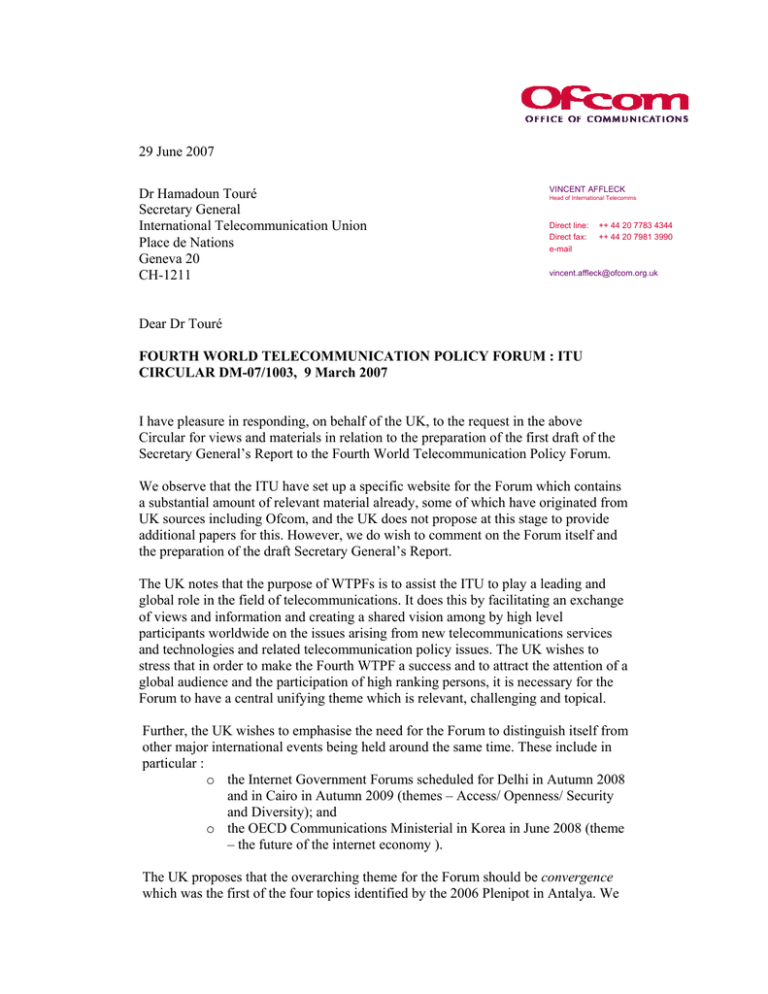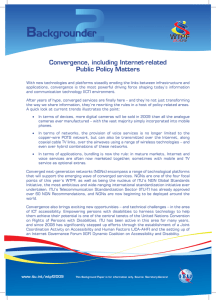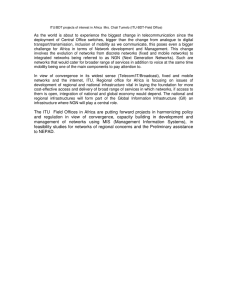29 June 2007 Dr Hamadoun Touré Secretary General
advertisement

29 June 2007 Dr Hamadoun Touré Secretary General International Telecommunication Union Place de Nations Geneva 20 CH-1211 VINCENT AFFLECK Head of International Telecomms Direct line: Direct fax: e-mail ++ 44 20 7783 4344 ++ 44 20 7981 3990 vincent.affleck@ofcom.org.uk Dear Dr Touré FOURTH WORLD TELECOMMUNICATION POLICY FORUM : ITU CIRCULAR DM-07/1003, 9 March 2007 I have pleasure in responding, on behalf of the UK, to the request in the above Circular for views and materials in relation to the preparation of the first draft of the Secretary General’s Report to the Fourth World Telecommunication Policy Forum. We observe that the ITU have set up a specific website for the Forum which contains a substantial amount of relevant material already, some of which have originated from UK sources including Ofcom, and the UK does not propose at this stage to provide additional papers for this. However, we do wish to comment on the Forum itself and the preparation of the draft Secretary General’s Report. The UK notes that the purpose of WTPFs is to assist the ITU to play a leading and global role in the field of telecommunications. It does this by facilitating an exchange of views and information and creating a shared vision among by high level participants worldwide on the issues arising from new telecommunications services and technologies and related telecommunication policy issues. The UK wishes to stress that in order to make the Fourth WTPF a success and to attract the attention of a global audience and the participation of high ranking persons, it is necessary for the Forum to have a central unifying theme which is relevant, challenging and topical. Further, the UK wishes to emphasise the need for the Forum to distinguish itself from other major international events being held around the same time. These include in particular : o the Internet Government Forums scheduled for Delhi in Autumn 2008 and in Cairo in Autumn 2009 (themes – Access/ Openness/ Security and Diversity); and o the OECD Communications Ministerial in Korea in June 2008 (theme – the future of the internet economy ). The UK proposes that the overarching theme for the Forum should be convergence which was the first of the four topics identified by the 2006 Plenipot in Antalya. We are beginning to experience real convergence in the UK electronic communications market already and we believe that it will be a global trend by 2009 bringing many challenges to administrators, industry and users of telecommunications services and having implications for both the telecommunications and radio sectors. However, the Forum should of course be structured to ensure that the other topics, identified by Plenipot as items for consideration by the Forum are fully covered. We therefore propose a possible structure for the Secretary General’s Report to the Forum as follows: o Section 1: Introduction This section could provide an overview of global communication developments. It could present how the markets are changing and how incumbents face increased pressure in national markets both because of greater domestic competition as well as from new global players entering the market, for example search engines (Google/ Yahoo) and social networking sites (MySpace/ Youtube). The Section should also define convergence and cover its historical context. o Section 2 : Forms of Convergence This section could examine the different forms of convergence and the factors that have facilitated its development. This would cover the emergence of all IP based networks/ NGNs and convergence of technical platforms/ networks and devices. Other issues may include the impact of broadband take up, increase in broadband speeds, growth of hot spots and facilitating factors such as Wi-max/ LLU. o Section 3 : Market Developments This would consider new market structures, inter-platform competition and investment, in particular the internationalisation of communications markets and services provided across national borders. It would address the entry of telecoms/ satellite/ cable and broadcasters into each others markets and the emergence of new players. It could look at bundling offers available (triple play/ quadruple play) as well as at new converging services such as VoIP, IPTV and mobile TV. The Section could also cover mergers and consolidations in the market and the user experience of the converged multimedia network. o Section 4 : Regulatory framework This Section could usefully provide an overview of current regulatory frameworks, including regulatory institutions and relevant regulatory decisions such as LLU; scope of universal service and approaches to network and content regulation. It should review the impact of privatisation, liberalisation of international facilities and the growth of international traffic and services such as by-pass and call back. Other issues to cover could include numbering, quality of service, emergency telecommunications and disaster relief. It should also cover the scope of ITRs. o Section 5 : Challenges This should be the meat of the Report. Building on the above Sections, it should look forward and consider the various challenges that convergence poses to existing institutions and rules including ITU Recommendations, ITRs and its processes and procedures. One possible way of approaching this Section might be to divide the analysis into four parts: (i) issues affecting networks (such as NGA, spectrum access, interoperability); (ii) issues affecting content (including copyright and DRM, global and regional protection and the impact of differing cultural standards); (iii) issues relating to user experience (quality of whole user experience going beyond simple network performance and reproduction quality to factors such as handset design and ease of use of handsets, remotes etc) and (iv) the institutional challenges and the benefits, or otherwise, of converged and independent regulators. o Section 6 : Additional issues for developing countries Developing countries and countries in transition face the same challenges as developed countries but the impact and appropriate regulatory responses might be different because of less fully developed networks, lower penetration of fixed telecommunications and PCs and potentially limited access to capital. The Section should also cover capacity building. o Section 7 : Implications This Section should bring together the strands in the previous sections and consider the impact of convergence on the various stakeholders, ie ITU Administrations, Sector Members and consumers. In particular, it should consider what this means for the role of ITU and its future work programme including the ITRs and internet governance related issues such as security/ domain names. It may also consider the role of Regulators in ITU. o Section 8 : Recommendations List specific recommendations for agreement as a way forward. I am very willing to answer any queries on the above response and expand on the points made as required. Otherwise, I look forward to seeing the first draft of the Secretary General’s report in due course. Yours sincerely Vincent Affleck


